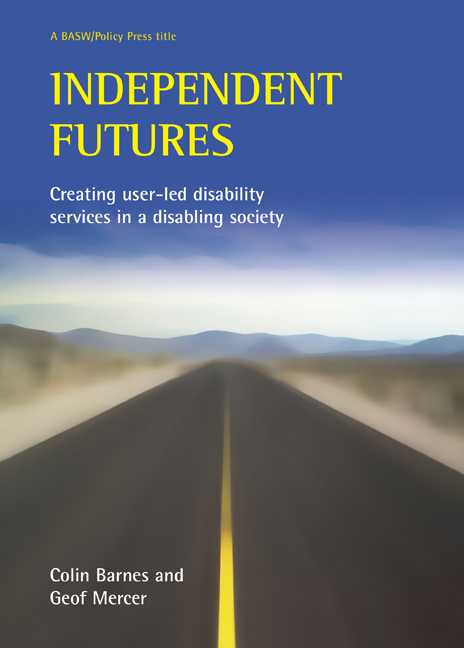Book contents
- Frontmatter
- Contents
- List of figures and tables
- Acknowledgements
- Notes on the authors
- one Examining user-led services
- two Traditional approaches: disability policy and the welfare state
- three Disability activism and the struggle for independent living
- four Researching user-led organisations
- five User-led organisations: building an alternative approach
- six Service design and delivery: opportunities and constraints
- seven Service users’ views and experiences
- eight Politics and campaigning
- nine Policy change or retrenchment?
- ten Future directions
- References
- Index
ten - Future directions
Published online by Cambridge University Press: 15 January 2022
- Frontmatter
- Contents
- List of figures and tables
- Acknowledgements
- Notes on the authors
- one Examining user-led services
- two Traditional approaches: disability policy and the welfare state
- three Disability activism and the struggle for independent living
- four Researching user-led organisations
- five User-led organisations: building an alternative approach
- six Service design and delivery: opportunities and constraints
- seven Service users’ views and experiences
- eight Politics and campaigning
- nine Policy change or retrenchment?
- ten Future directions
- References
- Index
Summary
Introduction
Since the middle of the 20th century, there has been a gradual but intensifying politicisation of disability by disabled people and their organisations, with an evident impact on government social welfare policies. The economic, political and cultural upheavals of the 1960s coupled with the harsh realities of traditional exclusionary policies for people with accredited impairments provided a fertile breeding ground for radical new ways of thinking about disability. These include the concept of independent living, the re-interpretation of disability as social oppression, the social model of disability, and the demand for choice and control of disability-related services.
Subsequent trends in the political climate and the ensuing escalating marketisation of social welfare precipitated the slow but significant shift of these ideas from the margins to the mainstream. Over the last decades this is clearly reflected in the UK with the introduction of the 1995 Disability Discrimination Act, the 1996 Community Care (Direct Payments) Act and subsequent amendments, and the Prime Minister's Strategy Unit (PMSU) document Improving the Life Chances of Disabled People with its unequivocal endorsement of independent living, a socio-political understanding of disability, individualised budgets and ‘Centres for Independent Living’ (CILs) (PMSU, 2005). However, this formulation offers no recognition of distinctions now made by disabled people between ‘independent’, ‘integrated’ and ‘inclusive’ living (see Chapter Five). Furthermore, while there is a general consensus within the Disabled People’s Movement on the desirability of these ideas, the implementation of government policies presents a significant challenge for disabled activists and their organisations.
This concluding chapter will draw together some salient policy implications for politicians, policy makers and professionals concerned with the further development of independent living for disabled people and user involvement in services for this increasingly large and diverse section of the UK population.
Key themes and issues
Both the philosophy of independent living and the social model of disability warrant an holistic analysis of disabled people's individual and collective disadvantage in order to provide a just solution to their social exclusion. The definition of disabled people involves three elements:
(i) the presence of an impairment (ii) the experience of externally imposed restrictions and (iii) self identification as a disabled person. (Oliver, 1996b, p 5)
- Type
- Chapter
- Information
- Independent FuturesCreating User-Led Disability Services in a Disabling Society, pp. 181 - 192Publisher: Bristol University PressPrint publication year: 2006



